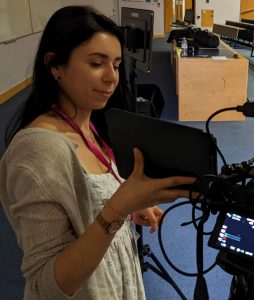Empowering Teaching Assistants in the Marking Process

Amélie is a teaching and learning professional, specialised in interdisciplinary learning and teaching theories of leadership to 100s of students each year at the University of Manchester. Her research background is in pedagogy in the arts, and she is passionate about how we learn and how knowledge can be most effectively transmitted in various environments. She is a Senior Fellow of the HEA and is currently working at the University College for Interdisciplinary Learning
I have been training teaching assistants (TAs) to assess students’ work for a few years now. Before this, I was a TA myself, and this experience has strongly informed my approach to marker training sessions. How best to train people that I used to be trained alongside? I knew first hand that we all struggle with self-confidence and the impostor syndrome when it comes to marking. Here are some of my own reflections.
Instilling self-confidence and beating the impostor syndrome are not just nice things to do. Over the years, I observed how self-confidence was not just a personal trait, but also an enabler of good teaching and marking. A marker who doubts themselves will keep changing their mind and will overcomplicate the process. A marker who feels like an impostor will feel the need to ‘prove’ that they can do it. That can lead, for instance, to feedback that picks up too much on minor details, giving the student the impression that their mark is low because of things that do not really matter. I’ve also seen many less experienced markers being overly harsh and I suspect this is because they want to demonstrate some form of authority.
So, training markers is more than making sure they can follow the marking guidance appropriately. Empowering them also plays an important part in the process. To do that, we have to understand what marking is, and is not.
Marking is not about representing authority, it is not about proving you know better than the student (this may sound obvious, but believe me, as a TA starting out teaching for an institution like the University of Manchester, this is what I thought I needed to do).
Marking is about evaluating a work based on certain criteria established in advance. But it is also about finding interest in what students write, keeping a curious mindset and rewarding students who can be creative while supporting arguments with evidence; rewarding students who are convincing from an academic perspective.

Each of my TAs has their own teaching and marking styles, and although consistency in marking is crucial, TA diversity is something that I want to embrace. For example, while I use a markscheme to train them to mark each paper in the right band, I do not ask them to adopt a certain style for their feedback, as long as the feedback is fair, detailed, and tailored to each student’s paper. Before marking takes place, we always look at a few scripts together and discuss strengths and weaknesses. These meetings allow us to self-reflect on our own marking style, tendencies and biases. It is an opportunity to become more self-aware of which of our own expectations we project onto a student’s paper. Sometimes these expectations are fair and in line with the markscheme, but sometimes they are a mere reflection of our own educational background and personal preferences. For instance, some of my GTAs tend to reward philosophical discussions too greatly because they come from a philosophical background. Others mark down students too much for an inconsistent referencing style, because that is something they have been constantly asked to pay attention to during their PhD.
Did you ever sense a joyful jubilation in the classroom when you dare say that you do not like a particular author or theory? This often leads to students engaging more with the materials because they realise that they, too, can disagree. They have a voice. It is the same thing with markers. When I say that I’m not the perfect marker myself and have some biases (I’m working on them, but I cannot pretend they do not exist), I can feel some excitement because the marking process has been demystified. If you are honest about its imperfections, TAs will feel empowered because you will have created a more collaborative space, where they feel valued and heard, which can significantly enhance their engagement and motivation. They will start to develop their own identity as assessors. Their rapport with students’ work will become more authentic, and they will, eventually be fairer, more consistent markers.
When a TA feels confident in their marking, they are more decisive and tend to review the same script fewer times. A not-so-confident marker often tends to go back to the same script multiple times. Although I encourage them to reflect on their marking, I have found that changing a mark multiple times overcomplicates the process, and most importantly, leads to overthinking from markers. There is a fine line between carefully evaluating all the marking criteria and relentlessly going back to the markscheme whilst reading a paper. Sometimes, the more they review a paper, the less the whole process makes sense to them.
I like to give them an example from a novel by French writer Balzac, The Unknown Masterpiece. In this novel, a painter tries so hard to perfect their work that they keep painting over what they have already painted. So much so that the painting eventually becomes chaotic and unrecognisable to anyone else. By trying to make it perfect, he has ruined it. I found the marking process similar in this sense: a marker needs to know when to stop reviewing, and that comes from a place of self-confidence. There is a point beyond which the evaluation of a paper becomes too personal (markers want to prove something about themselves, they start giving too much importance to insignificant details etc).

Convergence, by Jackson Pollock, 1952. Knowing when to stop is big topic in painting. Painters need to decide when their work has reached their full potential and when adding will start deteriorating what they have already done. Like markers!
Celebrating markers’ differences, their own styles, and presenting yourself as not the perfect marker either, are ways to empower TAs. We know that a learner will learn more efficiently if they are in control of their learning. Similarly, a marker will mark more efficiently if they are in control of their marking.







0 Comments